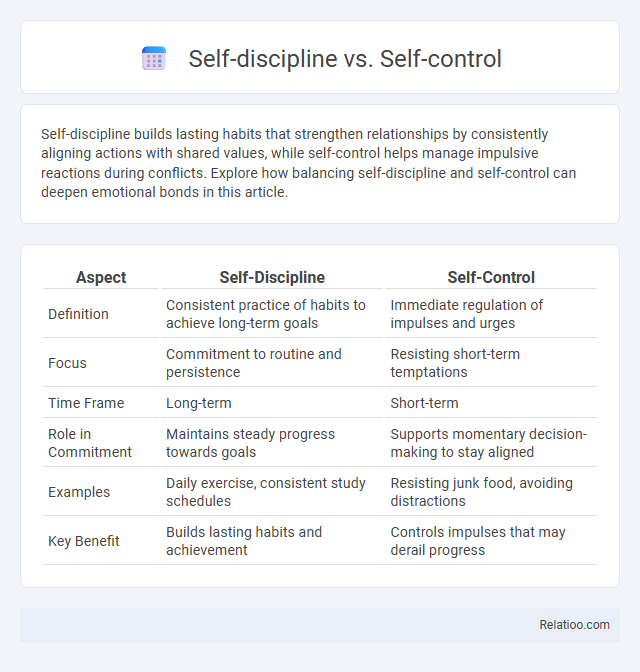Self-discipline builds lasting habits that strengthen relationships by consistently aligning actions with shared values, while self-control helps manage impulsive reactions during conflicts. Explore how balancing self-discipline and self-control can deepen emotional bonds in this article.
Table of Comparison
| Aspect | Self-Discipline | Self-Control |
|---|---|---|
| Definition | Consistent practice of habits to achieve long-term goals | Immediate regulation of impulses and urges |
| Focus | Commitment to routine and persistence | Resisting short-term temptations |
| Time Frame | Long-term | Short-term |
| Role in Commitment | Maintains steady progress towards goals | Supports momentary decision-making to stay aligned |
| Examples | Daily exercise, consistent study schedules | Resisting junk food, avoiding distractions |
| Key Benefit | Builds lasting habits and achievement | Controls impulses that may derail progress |
Understanding Self-Discipline and Self-Control
Self-discipline refers to the consistent practice of managing impulses and staying focused on long-term goals, while self-control specifically involves the ability to resist short-term temptations or urges. Understanding self-discipline requires recognizing it as a broader, sustained effort to maintain motivation and establish productive habits. Self-control acts as a critical component within self-discipline, enabling momentary restraint that supports overall goal achievement.
Key Differences Between Self-Discipline and Self-Control
Self-discipline involves the consistent practice of habits and routines to achieve long-term goals, while self-control refers to the immediate ability to resist short-term temptations or impulses. Self-discipline requires planning, commitment, and perseverance over time, whereas self-control is more about moment-to-moment restraint in decision-making situations. Understanding these distinctions helps individuals develop strategies for sustained success by integrating both long-term habits and instant impulse management.
The Psychology Behind Self-Discipline
The psychology behind self-discipline involves the brain's ability to regulate impulses, delay gratification, and maintain goal-directed behavior over time. Self-discipline is a sustained effort that requires the prefrontal cortex to manage competing desires, whereas self-control is more about momentary resistance to temptations. Understanding these mechanisms highlights how self-discipline differs by integrating consistent focus and motivation for long-term success rather than episodic control.
How Self-Control Influences Daily Decisions
Self-control directly impacts your ability to make thoughtful daily decisions by regulating impulses and delaying gratification, which promotes healthier habits and goal achievement. Unlike self-discipline, which involves long-term commitment and routine building, self-control functions moment-to-moment to steer choices amidst temptations. Effective self-control strengthens decision-making processes, ultimately supporting sustained self-discipline and focused effort over time.
Benefits of Cultivating Self-Discipline
Cultivating self-discipline enhances your ability to set goals and consistently work towards them, resulting in improved productivity and personal growth. Unlike self-control, which is the momentary restraint of impulses, self-discipline fosters long-term habits that build resilience and better decision-making skills. Developing self-discipline strengthens mental fortitude, enabling you to overcome obstacles and maintain focus on your priorities.
Situations Where Self-Control Matters Most
Self-control plays a crucial role in high-stress situations where immediate impulses must be managed, such as resisting unhealthy habits or avoiding distractions during critical tasks. While self-discipline involves long-term commitment and consistent habits, self-control specifically governs your ability to regulate emotions and reactions in the moment. Understanding when self-control matters most helps you navigate challenges that require instant restraint and decision-making.
Building Self-Discipline: Practical Strategies
Building self-discipline requires consistent practice and setting clear, achievable goals that align with Your values and long-term vision. Developing habits such as time management, prioritization, and regular self-reflection enhances focus and reduces reliance on fleeting self-control moments. Practical strategies include breaking tasks into smaller steps, eliminating distractions, and rewarding progress to sustain motivation and strengthen self-discipline over time.
Enhancing Self-Control: Actionable Tips
Enhancing self-control involves practical strategies like setting clear goals, practicing mindfulness, and building healthy habits to resist immediate temptations in favor of long-term rewards. You can improve your self-discipline by breaking tasks into manageable steps and consistently reinforcing positive behaviors through self-monitoring. Strengthening these skills creates a foundation for sustained motivation and better decision-making in everyday life.
Self-Discipline vs Self-Control: Which is More Important?
Self-discipline involves consistent habits and long-term goal commitment, while self-control refers to momentary restraint in challenging situations. Your success often depends more on self-discipline, as it builds foundational routines that sustain progress beyond isolated acts of self-control. Prioritizing self-discipline enhances your ability to maintain focus, achieve objectives, and develop resilience over time.
Integrating Both for Personal Success
Self-discipline and self-control are crucial yet distinct components of personal growth, where self-discipline involves consistent commitment to goals and self-control manages immediate impulses or temptations. Integrating both empowers you to maintain long-term motivation while navigating daily challenges effectively, fostering resilience and productivity. Developing this synergy enhances your ability to achieve sustained personal success through disciplined actions and conscious impulse regulation.

Infographic: Self-discipline vs Self-control
 relatioo.com
relatioo.com